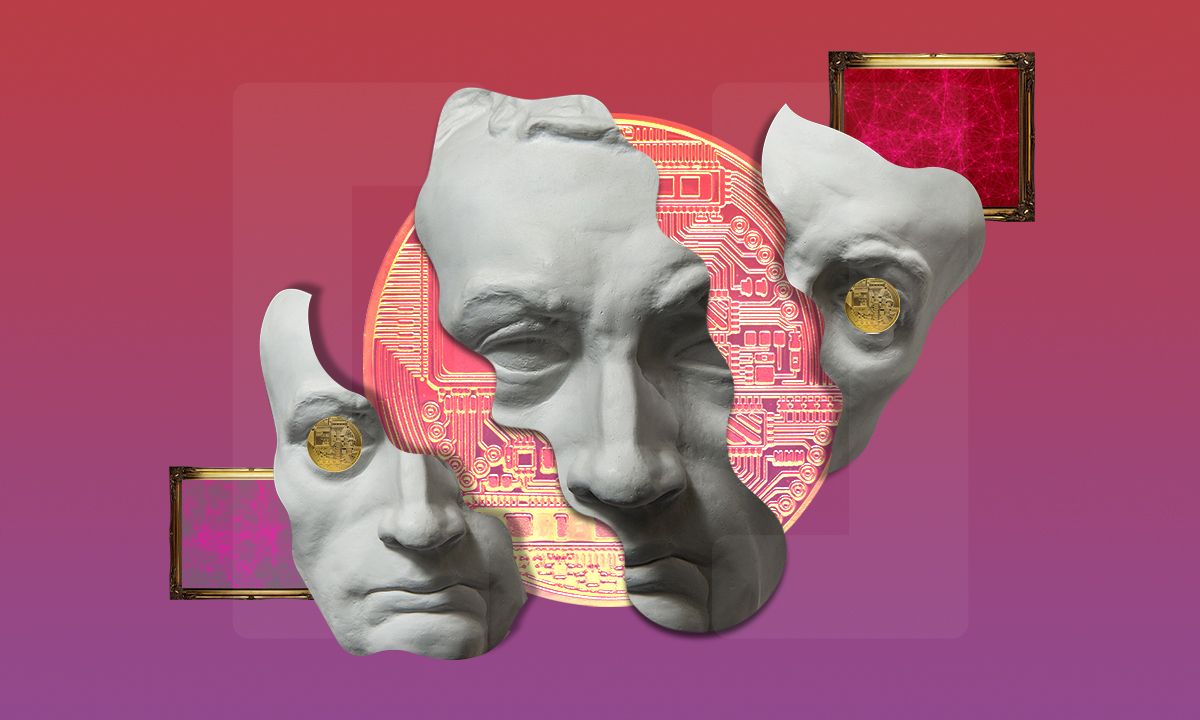Non-fungible tokens (NFTs) have become another huge trend in the world of blockchain. These unique digital tokens connect many industries, such as gaming, VR, e-sports, and even art.
Works of digital art are often saved as an NFT, as well as in-game land or characters. Many of these NFTs have been sold at exorbitant prices. In this article, we will take a look at what NFTs are and analyze the top 10 most expensive non-fungible tokens so far. Here we go!
What makes NFTs unique?
Non-fungible tokens are indivisible and unique crypto assets allowing for creating digital rarity. NFTs were initially created on the Ethereum (ETH) blockchain, according to the ERC-721 standard. Today, however, they are available on many other blockchains, like EOS, TRON, and NEO, and have many use cases. NFTs can represent digital collectibles, artworks, or in-game assets.
NFTs and their smart contracts contain identifying information, which makes each NFT unique. Thus, there are no two identical NFTs. In the case of banknotes, for example, you can exchange one banknote for another with the same denomination. They have the same value, so it makes no difference which one you possess.
Bitcoin (BTC) is a convertible token. You can send 1 BTC to someone, then they can forward it somewhere else, but its value always remains equal to one bitcoin. Since convertible cryptocurrencies are divisible, you can also send or receive a smaller fraction of bitcoin — satoshi.
One of the first NFT collectibles was CryptoKitties, an Ethereum blockchain-based game that lets users collect and breed virtual cats. Each blockchain-based cat is unique.
Why do people buy NFTs?
Well, people buy NFTs for the same reason they buy physical art or antiques. Aesthetics, a passion for artists, trends, and art-world validations are among the major factors that drive collectors to purchase artworks.
Collecting digital items is very similar to collecting physical items — they can be viewed as both a hobby and an investment.
Non-fungible tokens have unique attributes and are usually tied to a specific asset. They can be used to prove ownership of digital items such as gaming skins, as well as ownership of physical assets. NFTs can represent anything — from virtual real estate to works of art, to deeds, and even insurance policies.
However, you can’t trade NFTs on regular crypto exchanges. Instead, there are special digital markets like Openbazaar or LAND from Decentraland.
Now, let us get to the point and dive deeper into the top 10 most expensive NFTs ever!
1. Digital art collection from Beeple — $3.5 million
CGI artist Mike Winkelmann, known in the community as Beeple, made the biggest NFT sales in history. It all started with a Twitter post in which Beeple announced the sale of 21 of his works. The event quickly got pumped up as his art was based on NFTs. Moreover, everything was supported by documents and an authentic Beeple hair sample.
The auction was hosted by the NFT market Nifty Gateway that belongs to the Winklevoss brothers’ Gemini exchange. The first ten auctions were sold for over $900,000.
The bidders paid a total of over $1.2 million for another ten artworks. The auction of the last painting was announced just before its start. It was auctioned off by Tim Kang for $777,777. A total of 21 works of art was sold for $3.5 million. After the sale was over, the artist tweeted a video in which his friends were celebrating Beeple’s success, with a victory champagne shower.
2. Rick and Morty virtual images — $2.3 million
Another artist who managed to sell artworks in the form of NFTs at an exorbitant price is Justin Roiland, the creator of the popular animated series “Rick and Morty.” His collection of 16 works of art was sold for 1,300 ETH, which, at the time, was around $2.3 million.
Part of the proceeds from the auction was allocated to helping the homeless in Los Angeles, with Roiland saying that this was a way to test the limits of crypto art.
Interestingly, some of Roiland’s artworks were produced in multiple copies. Artworks titled “It’s Basically Tree Guy” and “Eligible Bachelors” cost $10 and $100 per piece, respectively.
The artworks created in a single copy were sold for higher prices due to their uniqueness and rarity. The piece entitled “The Simpsons” was sold for $290,100. The starting price for the auction was $14,999, as its physical counterpart had been sold for the same amount.
3. Land on Axie Infinity — $1.5 million
In first and second positions, we placed digital art collections that were sold through multiple transactions. This time, nine plots of land on popular blockchain game Axie Infinity were sold as a single NFT deal. The user who made the purchase paid 888.5 ETH, or $1.5 million, at the time.
Axie Infinity enables users to build a kingdom, with fantastic characters living in it. The world where you can buy virtual land is called Lunacia and has a limited number of places. The whole plot is divided into 90,601 smaller plots, 19% of which are owned by players.
The user who made this huge purchase, @Its_Falcon_Time, could become the owner of several apartments or plots of land in the real world for the same money. However, as he explained, digitization will move forward, and he treats this purchase as an investment. He said:
“We’re witnessing a historic moment; the rise of digital nations with their own systems of clearly delineated, irrevocable property rights. Axie land has entertainment value, social value, and economic value in the form of future resource flows.”
Falcon emphasized that the land he purchased is in a great location. What’s more, the trend on Axie Infinity is constantly growing, as evidenced by the dynamically growing number of active users. In the future, it will also be possible to organize events, such as festivals or concerts, on “your land,” and, thus, earn money.
4. Collectible character on CryptoPunks — $762,000
At the end of January, an NFT representing a character on the CryptoPunks game was sold for 605 ETH, or $762,000, at the time. The world of CryptoPunks is inspired by the crypto art movement and consists of over 10,000 unique digital characters.
Today, they can be bought and sold in the dedicated CyberPunks market. It’s worth mentioning that previously in-game characters were free and it was enough to have an ETH wallet to get them.
The NFT — which was originally captured in 2017 and then sold for such a high price — is #2890. It is an extremely rare “punk.”
5. A cat on the blockchain game CryptoKitties — 600 ETH
The next most expensive NFT in history is Dragon from the blockchain game CryptoKitties. This cute digital cat was sold for 600 ETH, or $200,000, at the time. Today, the same amount of tokens costs around a million dollars.
CryptoKitties is one of the earliest attempts to use blockchain technology for entertainment purposes. It was developed by Axiom Zen studio. Just like real cats, each virtual cat has unique DNA and its characteristics called “cattributes,” that can be passed onto offspring. Each virtual cat is unique and cannot be replicated or transferred without the consent of the owner.
In general, earlier generations of virtual cats are considered more valuable. This makes Dragon very rare — it is the ninth generation CryptoKitty.
6. An F1 Delta Time car — $110,000
Another NFT is a Formula 1 car on the F1 Delta Time game, more specifically the 1-1-1 model. An anonymous player bought this virtual racing car for a staggering 415.5 ETH.
At the time of purchase, it was over $110,000. As of today, such an amount of ETH is worth approximately $665,000. This purchase was awarded the title of the highest NFT transaction in 2019.
7. An F1 Delta Time track — $200,000
This time, however, not a car but part of a track. In early December 2020, a track piece on F1 Delta Time was sold for over nine million REVV tokens, or $200,000, at the time. Since then, REVV has increased by 500% and, at the time of writing, one would have to pay $1.2 million for the same amount of REVV.
For F1 Delta Time, all major in-game assets are represented by NFTs. The Circuit de Monaco virtual track consists of 330 such tokens divided into four levels — from “Rare” to “Apex.” Each token represents a virtual track share, giving its owner a set of privileges.
For this particular NFT, it was at the “Apex” level. Its buyer will receive 5% of all revenues from the game and 4.2% of the profits from elite staking, derived from player deposits. Both will be paid in REVV utility tokens.
8. NFT yinsure.Finance insurance — 350 ETH
“5000.0 ETH-Cover-NFT” is an insurance policy based on yinsure.Finance, a project backed by Yearn.Finance. Thanks to a dedicated digital policy, its owner receives insurance against errors in smart contracts on Curve.fi in the amount of 5,000 ETH. The NFT cost 350 ETH, which today is equal to over $560,000.
Yinsure is also known as Cover. In short, this is a combined insurance cover guaranteed by Nexus Mutual and a new type of tokenized insurance. Insurance policies are tokenized in the form of NFTs. Each of them is a unique NFT, also known as yNFT, and can be transferred, bought, or sold.
9. 12,600 square meters of virtual land in Decentraland — 514 ETH
Someone bought 12,600 sq. m for 514 ETH on the blockchain game Decentraland. The game is a decentralized, Ethereum-based virtual reality platform. Its users are able to create, experience, and monetize their content and applications.
Decentraland has a limited 3D virtual space called LAND. It is a non-fungible digital asset that is maintained by Ethereum smart contracts. The LAND owner has full control of their virtual land.
10. Land at 22,2 in Decentraland — 345 ETH
Here’s Decentraland once again. This time, it is a piece of land in a “good location” at 22,2.
In the world of Decentraland, the size of the land is fixed. About 80% of its space is privately owned and most of the rest is sold and leased by Decentraland. The remaining pieces of land, such as roads and squares, do not belong to anyone.
Players can only make their characters walk on the ground they own and on public grounds, so the placement is quite important. Land placed closer to popular venues will be more expensive than that situated in more distant areas.
Looking at how fast NFT markets are growing and at what prices non-fungible tokens are being sold, we can assume that this will be another huge trend right after DeFi. An important feature of NFTs is that each has its own unique and one-of-a-kind feature. NFTs are still a niche market, but have already found many applications.
Disclaimer
In adherence to the Trust Project guidelines, BeInCrypto is committed to unbiased, transparent reporting. This news article aims to provide accurate, timely information. However, readers are advised to verify facts independently and consult with a professional before making any decisions based on this content. Please note that our Terms and Conditions, Privacy Policy, and Disclaimers have been updated.


